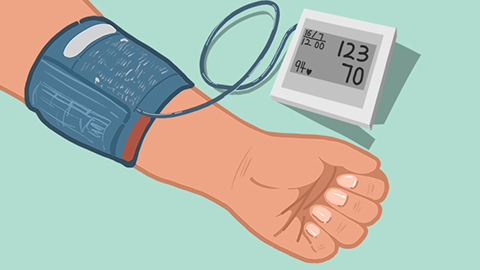Why is blood pressure high in the evening when taking telmisartan in the morning?
High blood pressure in the evening after taking telmisartan in the morning may be caused by unhealthy lifestyle habits, improper diet, inappropriate dosage, renal hypertension, or primary aldosteronism. Improvements can be made according to different situations. It is recommended to visit a hospital promptly and receive treatment under the guidance of a physician.

1. Unhealthy lifestyle habits: Excessive fatigue and chronic mental stress can stimulate the sympathetic nervous system, causing the release of hormones such as adrenaline, which leads to elevated blood pressure. It is recommended to balance work and rest appropriately, relax during work breaks with simple stretching exercises, and relieve mental stress through listening to music, meditation, and other methods.
2. Improper diet: Consuming excessive salt and high-fat foods during the day, such as pickled foods and fried foods, can lead to water and sodium retention, increased blood volume, increased cardiac workload, and consequently elevated blood pressure. Daily meals should be light, with salt intake controlled to no more than 6 grams per day, and consumption of high-fat foods should be reduced.
3. Inappropriate dosage: During medication, if hypertension worsens and the drug dosage is not adjusted timely, the antihypertensive effect may be suboptimal. Typically, there are no specific accompanying symptoms, but persistent elevation in blood pressure may cause discomfort such as dizziness and headache. It is recommended to seek medical advice so that the physician can adjust the dosage or adopt alternative medication plans based on the patient's condition.
4. Renal hypertension: Kidney diseases such as glomerulonephritis and renal insufficiency can activate the renin-angiotensin-aldosterone system, resulting in elevated blood pressure, often accompanied by symptoms such as proteinuria and edema. Under a physician's guidance, patients can use medications such as nifedipine controlled-release tablets, hydrochlorothiazide tablets, and captopril tablets to alleviate symptoms.
5. Primary aldosteronism: Excessive aldosterone secretion from the adrenal cortex can cause water and sodium retention and increased blood volume, leading to elevated blood pressure, accompanied by symptoms such as hypokalemia and muscle weakness. It is recommended to use medications such as spironolactone tablets, amiloride tablets, and eplerenone tablets under a physician's guidance to relieve discomfort.
In daily life, it is recommended to consume more fresh fruits and vegetables, whole grains, and other foods rich in dietary fiber, which can help maintain stable blood pressure.
References:
[1] Lü Fang, Niu Yaojie. Overview of the Study on Tianma Gouteng Decoction Combined with Captopril in the Treatment of Renal Hypertension [J]. Chinese Journal of Modern Drug Application, 2025, 19(03): 177-180.
[2] Xu Chengwei, Zhang Yao. New Advances in Non-invasive Localization Diagnosis of Primary Aldosteronism [J]. Journal of Clinical Urology, 2025, 40(01): 86-90+97.







